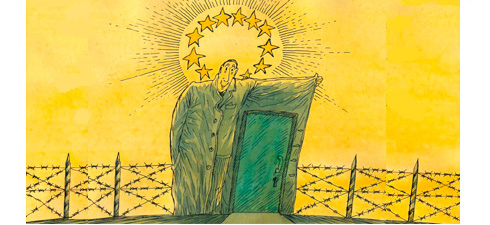The new hopefuls for entry into the European Union have to get up early in the morning. Hundreds of mostly young Moldovans gather before down in front of the Romanian consulate in Chisinau, the capital of the Republic of Moldova, the poorest country in Europe.
Denis Rotari, a trained tiler sporting a light-blue T-shirt and a dragon tattooed on his elbow, has come to earn the wages of love: "I need money for my wedding,” says the 21-year-old Moldovan. Like everyone else in the queue, he’s applying for a Romanian passport – and with it the hope of finding odd jobs as a hired hand anywhere between Rome and Lisbon.
Close to a million Moldovans have already turned their backs on their country, whose per capita GDP is just about on a par with the Sudan’s. They hire themselves out abroad, generally as illegal workers. Some 120,000 of the country’s 3.6 million residents have already obtained Romanian passports, and over 800,000, according to the government in Bucharest, are waiting for their applications to be processed. To cope with the onslaught, Romania’s foreign minister has opened two new consulates in the provincial towns of Balti and Cahul – at the EU’s expense.
The object is simple: Romania’s jingoistic president Traian Basescu is out to increase the ranks of his subjects – and has now pledged to step up the pace of naturalisation before the end of the year to 10,000 new citizens a month. So without a single referendum, without any say-so from Brussels, Berlin or Paris, the enlargement-weary EU is undergoing a de facto eastward enlargement under the radar. The Moldovans are voting with their feet and slipping into the EU promised lands through the back door.
Ever since the "Alliance for European Integration" in Chisinau ousted the pro-Russian Communists in 2009, Romania has been forging ahead with its naturalisation offensive for its little neighbour. Bucharest treats Moldovan foreign ministry staff to courses in "Euro-Atlantic Integration" and pays for the translation of EU legislation. Last year, though hard hit by the economic crisis itself, Romania lent lavish sums to its neighbour. The barbed wire along the frontier has been taken down, and since last autumn residents of a 30-km-wide border strip can even travel to Romania without a visa now.
Romanians and Moldovans live in different countries, to be sure, “but we’re one people, and that people has a right to its unification and a shared future,” argues Romanian president Basescu, who dreams of a Romania Mare, a resurrection of "Greater Romania” in its 1940 borders, i.e. including Moldova.
And Moldova’s new leadership is not averse to Romania’s advances. 9 out of 53 members of parliament from the governing coalition have dual Moldovan-Romanian citizenship themselves. Acting president Mihai Ghimpu is an out-and-out Unionist, and his nephew Dorin Chirtoaca, mayor of Chisinau, propounds, “Romanians and Moldovans have close bonds, like Germans and Bavarians.” The idea of a separate state was “an illusion of the Soviet power”.
As a matter of fact, however, most Moldovans are not thrilled about the prospect of uniting with Romania, the second-poorest country in the EU after Bulgaria. According to opinion polls, two-thirds of them want to join the EU, but only 2% consider themselves Romanians. Out in front of the Romanian consulate, Denis the tiler says frankly, “With the passport I just want to go further west. I don’t give a damn about Romania.” His cousin is already working at a slaughterhouse in Madrid. When Romania joins the Schengen Area in March 2011, hundreds of thousands of Moldovans fitted out with Romanian passports will have free passage for good into the EU.
In the meantime, the steady stream of migrants has not escaped notice even in Brussels. Right-wing populists are priming to capitalise on the issue. Andreas Mölzer, MEP from Austria’s FPÖ right-wing populist party, has called on the EU Commission to take a stand on how it intends to stop the Romanian machinations. "As far as Germany is concerned, however, there are no grounds for concern,” assures Manfred Grund, a Christian Democrat member of the German Bundestag. "Most of them are only heading to Italy or Spain.”
Reactions
EU seeks to curb influx
“Europe is pressing Romania to renounce its claims on Moldova,” reports România Liberă. While Romania presents its neighbour as an outpost of the EU, notes the Bucharest-based daily, other member countries object to its policy of handing out passports to Romanian-speaking Moldovans. Some of that hostility is owing to Western Europeans’ efforts to redefine their relations to Russia and recognise Moscow’s sphere of influence, explains România Liberă. The 100,000 passports already granted and the 10,000 per month Bucharest pledges to dole out in future are deemed a menace by its European partners, who fear the mass westward migration of cheap labour.
Do you like our work?
Help multilingual European journalism to thrive, without ads or paywalls. Your one-off or regular support will keep our newsroom independent. Thank you!
















